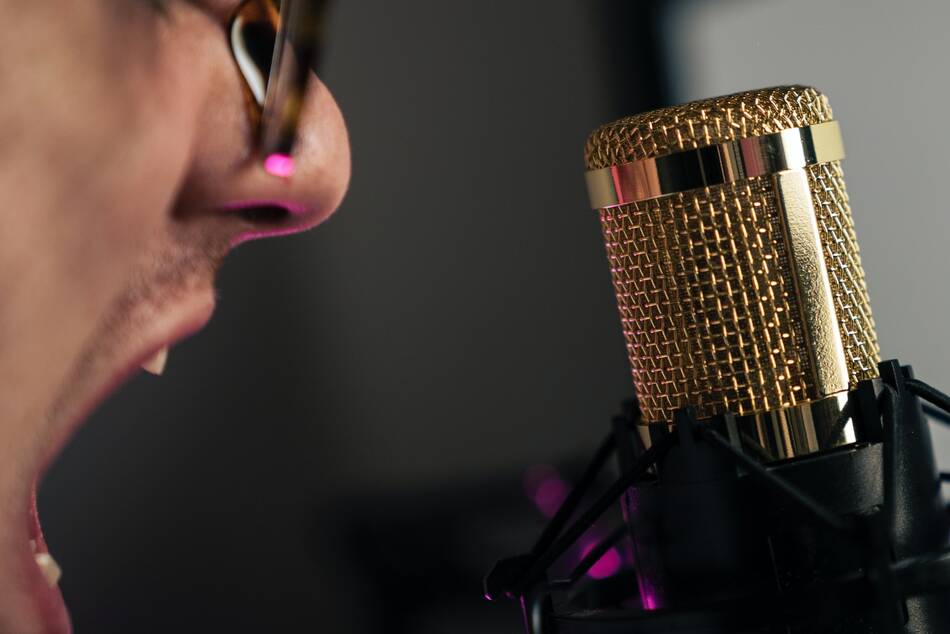
Perhaps you are a bass player who wants to double as a singer, and you want to use your bass amp for vocals instead of investing in a PA system. Or maybe you’re playing a gig where there is no PA system at the venue, and you have no option other than to run the vocals through a bass amp.
Whatever the reason, certain situations require us to employ less than ideal solutions. So let’s discuss this topic once and for all. Is it a good idea to sing through a bass amp? Can you run vocals through a bass amp?
In short, yes. You can run vocals through a bass amp. A microphone can be plugged into a bass amp, and you can sing through it without any potential damage. However, the vocals will not sound great because bass amps cannot play most of the mids and high frequencies of the vocals.
If you came for a short, straight-to-the-point answer, there you go. However, there are several reasons why bass amps are simply not ideal for singing. And we’re going to take a look at all of them. I’ll also give you some tips on how to run vocals through a bass amp, the most effective way. And then I’ll follow that up with some alternatives to the bass amp that are much more ideal for vocals.
Table of Contents
Why Bass Amps are Not Ideal for Vocals
The overall sound quality of vocals through a bass amp won’t be great. And this can be attributed to several factors. Let’s take a look at them.
1. Vocals will sound too bassy
The singing voice and vocals, in general, contain a lot of midrange and high frequencies. It does contain bass frequencies, but most of the frequencies of the human voice exist in the mids and high frequencies.
This means any speaker or amp that you sing or run vocals through should be able to playback all those mid and high frequencies in the best possible way.
However, most bass amps lack the ability to reproduce midrange and high frequencies. Bass amps are uniquely designed to enhance the lower frequencies. That’s because they are made for the bass guitar, which has more lows than the mids and highs. That is why many bass amps have no tweeters to play the high frequencies of an audio signal.
So when you run vocals through a bass amp, all you’ll hear are the low frequencies and a bit of the midrange frequencies of the vocal. Simply put, your singing voice or vocals will be bassy when run through a bass amp. The vocal will lose its clarity and the spark, which exists mostly in the highs.
2. Feedback issues
Something I found on many forums while researching this article was that many people who have tried plugging a microphone into a bass amp to sing through it experience a lot of audio feedback issues.
There is an unbearable squealing noise from the bass amp when a microphone is connected to it. And it gets louder when you try to increase the preamp gain on the bass amp.
Feedback issue is very common, and it usually happens when you’re running a microphone through a speaker, and you’re standing in front of the speaker with the mic.
However, those who have tried this setup complained they still had feedback issues even when they are a couple of feet away from the bass amp. Some even
From my judgment, not everyone who tries plugging a mic into a bass amp will experience feedback issues. However, I think it’s something you should expect when you are trying this setup.
3. Bass amps have no mic inputs
Another reason why bass amps are not ideal for singing is that they have no XLR mic inputs. Bass amps usually have only one input, and that input is a ¼” input jack.
This means, if you want to connect a microphone to a bass amp, you’ll need to use an XLR to ¼” cable or adapter. And that comes at an extra cost.
4. Bass amp preamp is not ideal for microphones
This ties into the previous point. Usually, devices with microphone inputs have a microphone preamp built into those inputs. The mic preamp helps boost the weak audio signal from the mic into a strong audio signal.
And although bass amps have a preamp built into them, these amps are not ideal for microphones.
Preamps built into bass amps are made to boost an instrument-level signal from a bass guitar, which is a much stronger signal compared to a mic’s audio signal.
The point I’m trying to make is, the preamp built into a bass amp cannot boost a mic signal loud enough. So chances are when you sing through a bass amp, your voice won’t be loud enough.
And the problem is, when you increase the preamp gain too much, that’s when you start getting the squealing feedback noise we’ve already talked about.
Use a Vocal, Keyboard or Acoustic Guitar Amp Instead
Perhaps you are a singer, and you don’t want to invest in an entire PA system before you can practice together with your band. Then I highly recommend you purchase a vocal amp. Just as bass amps are made for the bass guitar, and keyboard amps are made for keyboards, vocal amps are made for, well, you guessed it — vocals.
These amps are uniquely designed to accurately reproduce the human voice and any vocals you run through them. They usually have a mic preamp built into them and can also supply phantom power to condenser mics if that’s your choice of microphone.
A vocal amp I’ll highly recommend is the Behringer Eurolive B205D Compact Vocal Amp (on Amazon). This option has two mic inputs, all with a built-in mic preamp. And an extra RCA input if you decide to connect your phone and play some music through them.
There is also a 3-band EQ to shape your voice. On top of it all, it’s extremely portable, weighing only 7.05lbs. Meaning they are very easy to transport. Feel free to check it out.
If there is a keyboard or an acoustic guitar amp available, I highly recommend you run vocals through them instead of a bass amp. Here are a couple of reasons why.
Firstly, Keyboard and acoustic amps have full-range cabinets. This simply means these amps are made to play all audible frequencies in an audio signal.
Keyboard and acoustic guitar amps have a wide frequency range, unlike bass amps. So they can play all the low, mid, and high frequencies of the human voice. And this means the overall sound quality of your singing voice or any vocals you run through them will be so much better compared to a bass amp.
I made a comparison between bass amps and keyboard amps in this article. Feel free to check it out if it’s something you’re interested in knowing.
Secondly, many keyboards and acoustic guitar amps have a microphone input. And these inputs usually have a decent mic preamp built into them. So, you can directly plug your microphone into them, and you’ll get a loud enough audio output from your mic.
One example of such amps is the Behringer Ultratone K450fx Keyboard Amp (on Amazon). This amp has three input channels, with a 5-band EQ and five different effects. On channel 1 is an XLR Mic input where you can plug in your microphone directly and sing through the amp.
Thirdly, keyboard and acoustic amps usually have multiple inputs. So, if you are a solo artist looking to play your instrument and sing at the same time using one amp, a keyboard or acoustic amp is the best option.
This also means you can connect your microphone and sing through the keyboard amp of your band while the keyboard player is playing through the amp at the same time.
Tips for Using a Bass Amp for Vocals
If you have no option other than to sing through a bass amp or run vocals through them, here are some tips on how to do that in the best possible way.
1. Use an External Mic Preamp
As I already mentioned, the built-in preamp in a bass amp will not give your microphone enough boost. That’s because those preamps are made for instrument-level signals and not mic-level signals.
So if you want to sing through a bass amp, I recommend you get an external mic preamp. Since it is made to pre amplify mic-level signals, you’ll get a much stronger line level from it than with the bass amp’s preamp.
2. Use an XLR to ¼” Adapter
If you have no access to a preamp, then your only option is to connect the mic directly to the bass ampm. The standard input port of a bass amp is a ¼” TS/TRS port. This means you can’t connect an XLR mic cord to it.
So, the only way to connect a microphone to a bass amp is to use an XLR to ¼” Adapter. This Adapter will be connected to one end of your microphone’s XLR cable, and convert it into a ¼” jack which can then be connected to the bass amp.
You can pick up one of these adapters on Amazon for about 8 bucks, and they will easily get the job done.
3. Shape the Vocals with EQ
As we’ve already talked about, your voice won’t sound so good when run through a bass amp. That’s because bass amps are capable of playing only the low and some of the midrange frequencies.
However, there is something you can do to improve how the voice sounds through the amp. And that is tweaking the Equalizer.
Fortunately, most bass amps have an equalizer built in. Most bass amps have 3-band EQ knobs used to shape their tone. So simply tweak these knobs till the vocals sound much better.
You can experiment with turning down the lows and boost the mids and high frequencies using the knobs.
Conclusion
In summary, you can sing through a bass amp without any potential damage. It will work. However, your voice won’t sound good. That’s because bass amps cannot play the mids and high frequencies in the human voice. And that will result in dull-sounding vocals.
However, you can improve how your vocal sounds through a bass amp by tweaking the EQ to bring out the mids and highs.

Hi, I’m Raymond. A keyboard player, music producer, and writer. And I’m also the founder of this blog. As someone who has been working with several audio and music equipment and different musicians for many years, my goal is to answer all your questions on music and equipment, as well as the latest music software and technology. For more info, check out my about me page

